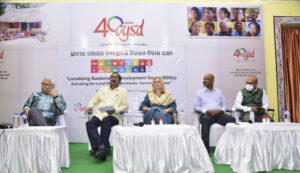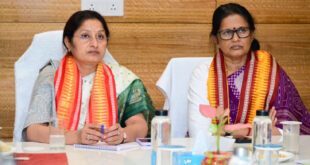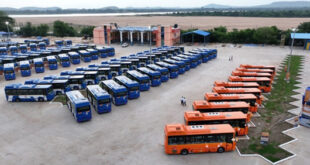Activating local governments, PRIs key to achieve SDGs: Experts
Bhubaneswar, 24/3/2022 ( Odisha Samachar )-: Even as Odisha’s performance in achieving the Sustainable Development Goals (SDGs) has increased by 10 score points in the year 2020, it still remains among bottom five states.
In order to put Odisha on the fast track of realising the SDG 2030 Agenda, it is high time the government, civil societies, corporate, business houses and other stakeholders worked for localising SDGs, said Jagadananda, the Co-Founder and Member Secretary of the Centre for Youth and Social Development (CYSD), a Bhubaneswar-based non-profit. SDGs cannot be realised without the partnership of people, he added.
Jagadananda was speaking during a panel discussion on “Localising SDGs: Activating the Local Self-Governments, Panchayat Bodies” on the 40th Foundation Day of the CYSD here on Thursday.
Emphasising on the need for involving local self governments in understanding and implementation design of SDGs, SN Tripathy, Director General of the Indian Institute of Public Administration (IIPA), said, with a new set of urban and rural local bodies, Odisha has immense potential to carry out the planning and implementation at grassroots level.
Palli Sabhas and Gram Sabhas need to be strengthened to take forward the SDGs. He emphacised that the current framework of the Gram Panchayat Development Plan (GPDP) be aligned with the SDGs and the capacity building framework for the PRIs be developed accordingly. Currently, the GPDP capacity building module is not aligned with the SDGs, Tripathy added.
Chandrasekhar Kumar, Additional Secretary, Ministry of Panchayati Raj, said realisation of SDGs requires an integral approach and the PRI members should be involved in each processes. SDGs should be simplified for proper understanding of the villagers and the CSOs need to be engaged in this, he added further.
Monika O Neilson, Chief of Field Office, Unicef India, said there should be partnership at the community level – local youth, Panchayati Raj Institutions (PRIs) members, NGOs and CSOs – to recognise the local contexts from setting of goals and targets to determining the means of implementation and facilitate stewardship. Simultaneously, partnership is required at the higher level – bureaucracy, academia, UN houses and media to influence the policy framework, she pointed out.
Dr. Saroj Dash, Joint Director, the State Institute for Rural Development and Panchayati Raj (SIRD & PR), lamented that currently the SDGs are confined to district level. It is high time each stakeholder at block, panchayat and village level was sensitised to work for creating an appropriate framework for inclusive planning, budgeting and convergence.
When panchayats will be able to design an inclusive planning and budgeting, they will be able to best uitilise the funds available under the 15th Central Finance Commission and 5th State Finance Commission. It will also help them to mobilise resources from other sources, pointed out Dash.
Dr. Abhaya Kumar of World Food Programme pointed out that specific capacity building is required for the PRIs and frontline workers on data management. It will help them to monitor the process of implementation. He also emphasised on developing village and panchayat-level data dashboard.
Prof AB Ota, Director-cum-Special Secretary, Scheduled Castes and Scheduled Tribes Research and Training Institute (SCSTRTI), maintained that the mandate of decentralisation of SDGs calls for priority attention towards tribal regions. SDGs planning for tribal areas must include their indigenous knowledge, traditions, culture and resources.
Chief Minister Naveen Patnaik through his video message lauded the efforts of CYSD for catalysing the development process in rural and tribal pockets.
Among others, Ambika Nanda, Co-Convener-CSR, Indian Chamber of Commerce (ICC); Abha Mishra, State Head, UNDP; JB Pani, Odisha Chairman, ICC; Rajesh Tondon, UNESCO Co-chair on Community Based Research, India also spoke during the panel discussion that was coordinated by Basanta K Nayak of CYSD.
==
 Odisha Samachar Odisha Breaking News , Odisha Current News , Odisha News
Odisha Samachar Odisha Breaking News , Odisha Current News , Odisha News



